Gaia hypothesis - Study guides, Class notes & Summaries
Looking for the best study guides, study notes and summaries about Gaia hypothesis? On this page you'll find 46 study documents about Gaia hypothesis.
Page 2 out of 46 results
Sort by
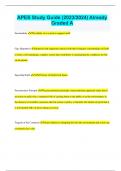
-
APES Study Guide (2023/2024) Already Graded A
- Exam (elaborations) • 20 pages • 2023
- Available in package deal
-
- $9.99
- + learn more
APES Study Guide (2023/2024) Already Graded A Sustainabiliy The ability of a system to support itself Gaia Hypothesis proposes that organisms interact with their inorganic surroundings on Earth to form a self-regulating, complex system that contributes to maintaining the conditions for life on the planet. Spaceship Earth 1968 Picture of Earth from Space Precautionary Principle The precautionary principle or precautionary approach states that if an action or policy has a suspected risk of caus...
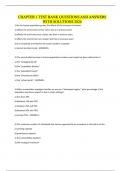
-
CHAPTER 1 TEST BANK QUESTIONS AND ANSWERS WITH SOLUTIONS 2024
- Exam (elaborations) • 8 pages • 2024
- Available in package deal
-
- $14.49
- + learn more
CHAPTER 1 TEST BANK QUESTIONS AND ANSWERS WITH SOLUTIONS 2024 1) As the human population grows, the effects of this increase in humans: a) affects the environment at the same rate as in previous years b) affects the environment at a faster rate than in previous years c) affects the environment at a slower rate than in previous years d) are completely unrelated to the actual numbers of people e) cannot be determined - ANSWER b 2) The uncontrolled increase in human population numbers s...
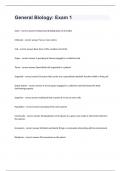
-
General Biology: Exam 1 Question Fully Solved.
- Exam (elaborations) • 10 pages • 2024
-
Available in package deal
-
- $12.99
- + learn more
Atom - correct answer Fundamental building block of all matter Molecule - correct answer Two or more atoms Cell - correct answer Basic form of life; smallest unit of life Organ - correct answer A grouping of tissues engaged in a collective task Tissue - correct answer Specialized cells organized in a pattern Organelle - correct answer Structure that carries out a specialized metabolic function within a living cell Organ System - correct answer A set of organs engaged in a colle...
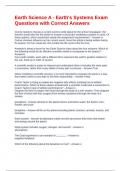
-
Earth Science A - Earth's Systems Exam Questions with Correct Answers
- Exam (elaborations) • 5 pages • 2024
-
Available in package deal
-
- $10.49
- + learn more
Connie needs to choose a current event to write about for the school newspaper. Her teacher would also like the article to include a visual aid, modeling a system or cycle. Of these options, which would best satisfy the assignment requirements? - Answer-a. Connie chooses influenza as her current event, since the article is being written during flu season. For her visual aid, she models the life cycle of the flu virus Amanda is doing a report for her Earth Science class about the four seasons...
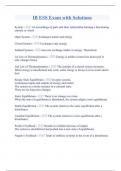
-
IB ESS Exam with Solutions
- Exam (elaborations) • 11 pages • 2024
-
Available in package deal
-
- $11.99
- + learn more
System - An assemblage of parts and their relationship forming a functioning entirely or whole Open System - Exchanges matter and energy Closed System - Exchanges only energy Isolated System - does not exchange matter or energy. Theoretical. 1st Law of Thermodynamics - Energy is neither created nor destroyed. It only changes forms. 2nd Law of Thermodynamics - The entropy of a closed system increases. When energy is transformed into work, some energy is always lost as waste...
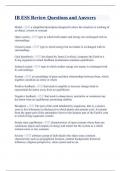
-
IB ESS Review Questions and Answers
- Exam (elaborations) • 9 pages • 2024
-
Available in package deal
-
- $10.49
- + learn more
Model - a simplified description designed to show the structure or working of an object, system or concept. Open system - type in which both matter and energy are exchanged with its surroundings Closed system - type in which energy but not matter is exchanged with its surroundings Gaia hypothesis - developed by James Lovelock, compares the Earth to a living organism in which feedback mechanisms maintain equilibrium Isolated system - type in which neither energy nor matter is exc...
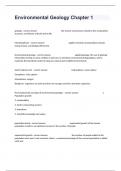
-
Environmental Geology Chapter 1 Comprehensive Exam Actual Questions And Detailed Answers.
- Exam (elaborations) • 3 pages • 2024
-
Available in package deal
-
- $12.99
- + learn more
geology - correct answer the science of processes related to the composition, structure, and history of Earth and its life Interdisciplinary - correct answer applies chemistry (composition), physics (natural laws), and biology (life forms) Environmental geology - correct answer applied geology; the use of geologic information to help us solve conflict...
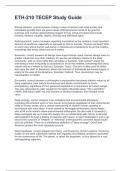
-
ETH-210 TECEP ecam with 100% correct answers 2024
- Exam (elaborations) • 10 pages • 2024
-
- $14.99
- + learn more
Ethical behavior correct answers Acting in ways consistent with what society and individuals typically think are good values. Ethical behavior tends to be good for business and involves demonstrating respect for key moral principles that include honesty, fairness, equality, dignity, diversity and individual rights. Anthropocentric correct answers regarding humankind as the central or most important element of existence, especially as opposed to God or animals. "Human-centered" ethic or wo...

-
IB ESS Exam Notes (100% correct answers)
- Exam (elaborations) • 9 pages • 2023
-
- $8.99
- + learn more
System correct answers An assemblage of parts and their relationship forming a functioning entirely or whole Open System correct answers Exchanges matter AND energy Closed System correct answers Exchanges ONLY energy Isolated System correct answers DOES NOT exchange matter or energy. Theoretical. 1st Law of Thermodyamics correct answers Energy is neither created nor destroyed. IT ONLY CHANGES FORMS. 2nd Law of Thermodynamics correct answers The entropy of a closed system increases...
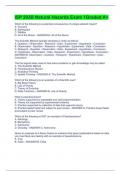
-
ISP 203B Natural Hazards Exam 1 Graded A+
- Exam (elaborations) • 7 pages • 2023
- Available in package deal
-
- $11.49
- + learn more
Which of the following is a potential consequence of a large asteroid impact? A. Tsunami B. Earthquake C. Wildfire D. All of the Above - ANSWER-D. All of the Above The Scientific Method typically develops in order as follows: A. Question - Observation - Research - Data - Experiment - Hypothesis - Conclusion B. Observation - Question - Research - Hypothesis - Experiment - Data - Conclusion C. Research - Question - Observation - Data - Experiment - Hypothesis - Conclusion D. Hypothesis ...

Study stress? For sellers on Stuvia, these are actually golden times. KA-CHING! Earn from your study resources too and start uploading now. Discover all about earning on Stuvia


